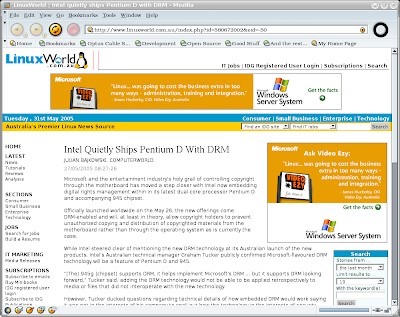Due to my attention being diverted by
GNU/Linux on my Toshiba P20 last year, I didn't make many updates to the
2004 rants and rave page. I just wanted to make some comments on what I did last year.
Last year, I was lucky enough to be in a presentation given by two influential people in the Open Source / Free Software movement. The first one was
Richard Stallman (you can scroll down the page of the link to find out what he looks like). Richard gave a very impressive speech on free software and how important it is to stop the mega-corporations just enforcing their rules on us - especially in Australia. It made much sense to hear him speak about how all software should be, and can be free (in the sense of freedom). People shouldn't be disheartened by the lack of quality free software, for if the software is truly free, it can continually be improved. And while there is some catching up to do in some areas of free software, eventually with enough effort and time, it will surpass proprietary (closed-source) software. I had never heard it termed like that before, and to me it made a lot of sense. After the presentation, I returned to my Linux machine and used in in a new type of passion (even though I have proprietary software on it in the form of Java and the nVidia drivers - but in the case of graphic cards, nVidia supports Linux with their proprietary drivers than ATI). At the end of the presentation, Richard offered some products to buy, and I purchased a
GNU 20th anniversary pin. Hopefully that microscopic donation can power Richard to keep giving more of those speeches, and awakening people to the concept of free software around the world.
The other person I met that I consider a major influence in the Open Source community was
Michael Tiemann. Michael talked on different topics to Richard. Where Richard spoke of the importance of keeping software free, Michael suggested many ways of how open source could make money (btw. Michael is more in-tuned with "Open Source", whereas Richard is more in-line with "Free Software" - there is a
difference). I've always found it hard to come to terms with the concept of making money with something you can essentially sell once, but can be copied many times over. His idea (and that of
Red Hat Linux) is not to make money from packaging up their property, as this means essentially once you ship a copy "out the door" your competitor can copy it and ship it too. The key is to make money by providing services, and selling value-added solutions to your customers. This allows for a very competitive market where innovating will mean that you're in the lead, and the customer wins as there is truly a free market. For example, if you're a customer of Red Hat, and they do something you don't like, you can change to
SUSE Linux, due to the "exit costs" of going from Linux to Linux being very low. Michael also offered a better model of how to calculate
Total Cost of Ownership (TCO). It should not just be calculated on purchasing or running costs, but it should also include exit costs too. Microsoft Windows appears to have a low TCO, but exit costs rarely enter into the equation. Sometimes upgrading between versions of Windows (eg. from Windows95 to WindowsNT4 to WindowsXP) and Microsoft products (like Office) are not as low as Microsoft would lead you to believe. The usual case is that things go wrong, and you'll end up uninstalling some other applications to make something work, and you'll find incompatibility between some versions. You've then got to factor in the cost of converting those products / documents into the new (Microsoft latest version friendly) format. A final point I took from Michael's presentation is that Open Source software gives people / companies the freedom to be different or be the same. If you like what other Open Source people / companies are developing, there is no harm in using that product as yours. If you don't, then there's no problems with writing your own. There are many more benefits that initially greet the eye. It also allows start-up companies basing their products on Open Source technologies to get a line-up of products in a relative short time.
Finally, one last point. Since I've started my "GNU/Linux on a Toshiba P20" page, I've met a few very interesting people. Some people have written to me about GNU/Linux (and how to install / use it). Some people have written to me about the Toshiba P20, but the majority that have written are about both. If you've got something you want to discuss with me, just feel free to write some e-mail to me. My address is
rdefrance (at) gmail (dot) com. I look forward to corresponding with all.
